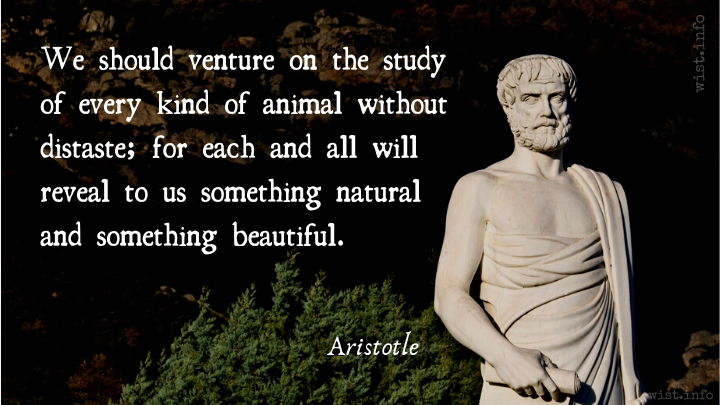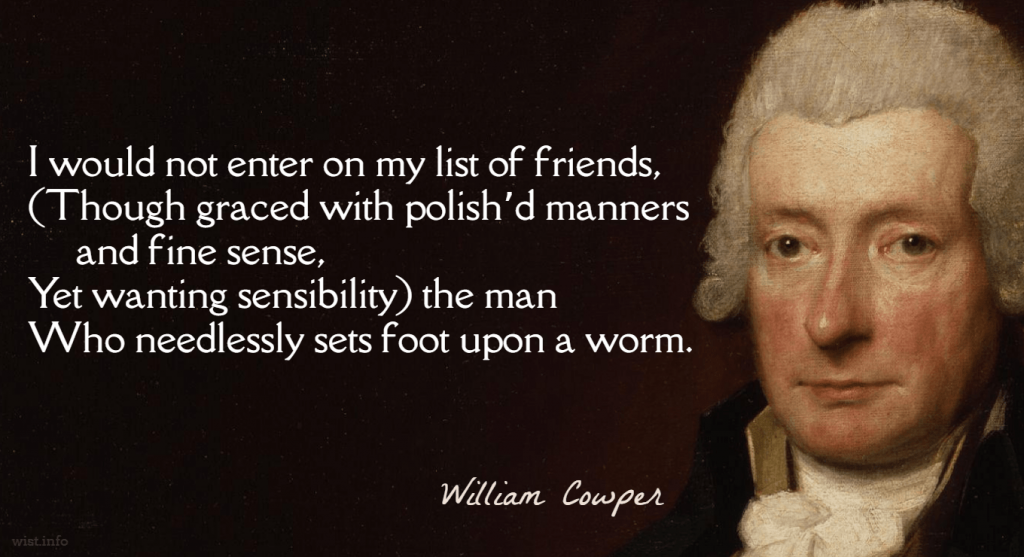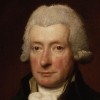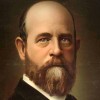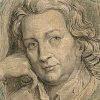We lavish on animals the love we are afraid to show to people. People might not return it; or worse, they might.
Mignon McLaughlin (1913-1983) American journalist and author
The Neurotic’s Notebook, ch. 1 (1963)
(Source)
Quotations about:
animals
Note not all quotations have been tagged, so Search may find additional quotes on this topic.
Enlarge within us the sense of fellowship with all the living things, our little brothers, to whom thou hast given this earth as their home in common with us. We remember with shame that in the past we have exercised the high dominion of man with ruthless cruelty, so that the voice of the Earth, which should have gone up to thee in song, has been a groan of travail. May we realize that they live, not for us alone, but for themselves and for thee, and that they love the sweetness of life even as we, and serve thee in their place better than we in ours.
Walter Rauschenbusch (1861-1918) American theologian, social reformer, Baptist pastor
Prayers of the Social Awakening, “For the World” (1910)
(Source)
This prayer is frequently misattributed to St Basil of Caesarea, often in a variant form such as this:
Oh God enlarge within us the sense of fellowship with all living things, our brothers the animals to whom Thou gavest the earth in common with us. We remember with shame that in the past we have exercised the high dominion of man with ruthless cruelty so that the voice of the earth, which should have gone up to Thee in song, has been a groan of travail.
The attributions to Basil are usually without citation, or with citations that are spurious in some fashion. For example, in Matthew Scully, Dominion: The Power of Man, the Suffering of Animals, and the Call to Mercy (2002), he cites Schaff and Wace, eds., A Select Library of the Nicene and Post-Nicene Fathers of the Christian Church, Second Series, Vol. 8 (1897), which is in fact about Basil's writings, but which does not appear to include this prayer.
Further discussion, in detail, can be found here: St. Basil’s “Animal Prayers” are a “Hoax” (Part One) | Animals Matter to God.
We recognize too that beasts have sight, hearing, smell, taste, touch, often more keenly than we have. Or take strength, vigour, muscular power, swift and easy movement of the body, in all of which we excel some of them, equal some, and are surpassed by some. We are certainly in a common class with the beasts; every action of animal life is concerned with seeking bodily pleasure and avoiding pain.
[Videre autem atque audire, et olfactu, gustu, tactu corporalia sentire posse bestias, et acrius plerasque quam nos, cernimus et fatemur. Adde vires et valentiam firmitatemque membrorum, et celeritates facillimosque corporis motus, quibus omnibus quasdam earum superamus, quibusdam aequamur, a nonnullis etiam vincimur. Genus tamen ipsum rerum est nobis certe commune cum belluis: jam vero appetere voluptates corporis, et vitare molestias, ferinae vitae omnis actio est.]
Augustine of Hippo (354-430) Christian church father, philosopher, saint [b. Aurelius Augustinus]
On Free Choice of the Will [De Libero Arbitrio Voluntatis], Book 1, ch. 8 / sec. 18 (1.8.18) (AD 288) [tr. Mark Pontifex (1955)]
(Source)
(Source (Latin)). Alternate translations:
Furthermore, beasts see, hear, and can perceive corporeal things by touch, taste, and smell more keenly than we. Add to this energy, power, strength of limb, speed, and agility of bodily motion. In all of these faculties we excel some, equal others, and to some are inferior. Things of this sort we clearly share with beasts. Indeed, to seek the pleasures of the body and to avoid harm constitute the entire activity of a beast's life.
[tr. Benjamin/Hackstaff (1964), ch. 8, sec. 62]
We recognize and acknowledge that animals can see and hear, and can sense material objects by touch, taste, and smell, often better than we can. Consider also strength, health, and bodily vigor, ease and swiftness of motion. In all of these respects we are superior to some animals, equal to others, and inferior to quite a few. Yet we have these sorts of traits in common with animals, though life of the lower animals consists entirely in the pursuit of physical pleasures and the avoidance of pains.
[tr. Williams (1993)]
Thus every Creature, and of every Kind,
The secret Joys of sweet Coition find:
Not only Man’s Imperial Race; but they
That wing the liquid Air; or swim the Sea,
Or haunt the Desert, rush into the flame:
For Love is Lord of all; and is in all the same.[Omne adeo genus in terris hominumque ferarumque,
Et genus aequoreum, pecudes, pictaeque volucres,
In furias ignemque ruunt. Amor omnibus idem.]Virgil (70-19 BC) Roman poet [b. Publius Vergilius Maro; also Vergil]
Georgics [Georgica], Book 3, l. 242ff (3.242-244) (29 BC) [tr. Dryden (1709), l. 375ff]
(Source)
(Source (Latin)). Alternate translations:
All men on earth, and beasts, both wilde and tame,
Sea-monsters, gaudy fowle, rush to this flame:
The same love works in all; with love ingag'd.
[tr. Ogilby (1649)]
Nor they alone: but beasts that haunt the woods,
The painted birds, the people of the floods,
Cattle, and men, to frenzy and to flame
Start wild: Love's empire is in all the same.
[tr. Nevile (1767), l. 289ff]
Thus all that wings the air and cleaves the flood,
Herds that or graze the plain or haunt the wood,
Rush to like flames, when kindred passions move,
And man and brute obey the power of love.
[tr. Sotheby (1800)]
Indeed every kind on earth, both of men and wild beasts, the fish, the cattle, and painted birds, rush into maddening fires; love is in all the same.
[tr. Davidson (1854)]
So then all kinds on earth of men and herds,
The ocean tribes, the beasts, the painted birds,
Rush all alike to frenzy and to flame;
Love rules them all, and love is still the same.
[tr. Blackmore (1871), l. 293ff]
Nay, every race on earth, whether of men or beasts, the watery tribes, the herds, the painted birds, rush headlong into this fiery phrenzy; love sways all alike.
[tr. Wilkins (1873)]
Nay, every race on earth of men, and beasts,
And ocean-folk, and flocks, and painted birds,
Rush to the raging fire: love sways them all.
[tr. Rhoades (1881)]
Thus all alike the slaves of love remain,
That haunt the woodland, or that graze the plain.
[tr. King (1882)]
In truth, every kind on the earth, both of men and wild beasts, the fish, the cattle, and plumaged birds, rush to the frenzy and the fire of love: in all there is the same love.
[tr. Bryce (1897)]
Yes all on earth, the race of man and beast, the tribes of the sea, cattle and coloured birds break into fury and fire; in all love is the same.
[tr. Mackail (1899)]
Yea, all -- all tribes of earth, all men, all cattle-herds,
Wild beasts of the forest, the brood of the sea, plume-painted birds,
Into flames of passion rush' all hearts are in one net taken.
[tr. Way (1912)]
For all terrestrial kinds, or beast or man,
All Ocean's brood and flocks of bright-hued birds
Haste to the same fierce fire. One power of love
Possesses all.
[tr. Williams (1915)]
Every single race on earth, man and beast, the tribes of the sea, cattle and birds brilliant of hue, rush into fires of passion: all feel the same Love.
[tr. Fairclough (Loeb) (1916)]
All manner of life on earth -- men, fauna of land and sea,
Cattle and coloured birds --
Run to this fiery madness: love is alike for all.
[tr. Day-Lewis (1940)]
Thus, every living creature, man and beast,
The ocean’s tribes, the herds, the colorful birds,
Rush toward the furious flames: love levels all.
[tr. Bovie (1956)]
Or, better, make it fire, the tongues of flame
burning like waves in a sunset, while all of life,
birds, fish, beasts of the fields, and men,
maddened, leap like lemmings into the sea,
that searing sea, that terrible tide of lust
to be like -- to become --
each, the fabulolus phoenix,
and rise renewed.
[tr. Slavitt (1971)]
Indeed all species in the world, of men,
Wild beasts and fish, cattle and coloured birds
Rush madly into the furnace: love is common
To all.
[tr. Wilkinson (1982)]
Every species on earth, man and creature, and the species
of the sea, and cattle and bright-feathered birds,
rush about in fire and frenzy: love’s the same for all.
[tr. Kline (2001)]
Every last species on earth, man and beast alike,
the vast schools of the sea, the cattle and bright-colored birds
fall helpless into passion’s fire: love is the same for all.
[tr. Lembke (2004)]
Indeed, all species on the earth, both man and beast,
the kingdom undersea, cattle and painted birds
into this hot lunacy rush: love strikes all the same.
[tr. Johnson (2009)]
All living creatures on earth, no matter whether
It's human beings or other kinds -- fish, cattle,
Beautiful birds -- they all rush into the fire:
Love is the same for all.
[tr. Ferry (2015)]
I do not know whether dogs can think, or what thinking is, or whether human beings can think. But whether human beings can think or not, I know that those who love dogs think that dogs can think. This, I am afraid, is the sum total of my contribution to human knowledge on this important subject.
Bertrand Russell (1872-1970) English mathematician and philosopher
“Do Dogs Think?,” New York American (1932-06-15)
(Source)
For men are sprung from the earth not as its inhabitants and denizens, but to be as it were the spectators of things supernal and heavenly, in the contemplation whereof no other species of animals participates.
[Sunt enim ex terra homines non ut incolae atque habitatores sed quasi spectatores superarum rerum atque caelestium, quarum spectaculum ad nullum aliud genus animantium pertinet.]
Marcus Tullius Cicero (106-43 BC) Roman orator, statesman, philosopher
De Natura Deorum [On the Nature of the Gods], Book 2, ch. 56 / sec. 140 (2.140) (45 BC) [tr. Rackham (1933)]
(Source)
(Source (Latin)). Alternate translations:
For men are not simply to dwell here as inhabitants of the earth, but to be, as it were, spectators of the heavens and the stars, which is a privilege not granted to any other kind of animated beings.
[tr. Yonge (1877)]
For men are formed from the earth, not as its inhabitants and occupants, but as spectators of the things above them in the sky, the spectacle of which is afforded to no other race of animate beings.
[tr. Brooks (1896)]
You have just dined, and however scrupulously the slaughterhouse is concealed in the graceful distance of miles, there is complicity ….
Ralph Waldo Emerson (1803-1882) American essayist, lecturer, poet
“Fate,” The Conduct of Life, ch. 1 (1860)
(Source)
I like handling newborn animals. Fallen into life from an unmappable world, they are the ultimate immigrants, full of wonder and confusion.
Diane Ackerman (b. 1948) American poet, author, naturalist
The Moon by Whale Light, ch. 4 “White Lanterns” (1991)
(Source)
I had time after time watched the progression across the plain of the Giraffe, in their queer, inimitable, vegetative gracefulness, as if it were not a herd of animals but a family of rare, long-stemmed, speckled gigantic flowers slowly advancing.
Isak Dinesen (1885-1962) Danish writer [pseud. of Karen Christence, Countess Blixen]
Out of Africa, Part 1 (1937)
(Source)
We call them dumb animals, and so they are, for they cannot tell us how they feel, but they do not suffer less because they have no words.
Anna Sewell (1820-1878) English novelist
Black Beauty, Part 4, ch. 36 “Jakes and the Lady” (1877)
(Source)
We therefore must not recoil with childish aversion from the examination of the humbler animals. Every realm of nature is marvelous: and as Heraclitus, when the strangers who came to visit him found him warming himself at the furnace in the kitchen and hesitated to go in, reported to have bidden them not to be afraid to enter, as even in that kitchen divinities were present, so we should venture on the study of every kind of animal without distaste; for each and all will reveal to us something natural and something beautiful.
Aristotle (384-322 BC) Greek philosopher
Parts of Animals [De Partibus Animalium], Book 1, part 5 (645a.15) (c. 350 BC) [tr. Ogle (1912)]
(Source)
Alternate translation:
For this reason we should not be childishly disgusted at the examination of the less valuable animals. For in all natural things there is something marvelous. Even as Heraclitus is said to have spoken to those strangers who wished to meet him but stopped as they were approaching when they saw him warming himself by the oven -- he bade them enter without fear, "for there are gods here too" -- so too one should approach research about each of the animals without disgust, since in every one there is something natural and good.
[tr. Lennox (2001)]
Animals are such agreeable friends — they ask no questions, they pass no criticisms.
George Eliot (1819-1880) English novelist [pseud. of Mary Ann Evans]
“Mr. Gilfil’s Love Story,” ch. 7, Scenes of Clerical Life (1857)
(Source)
One of the things I like best about animals in the wild is that they’re always off on some errand. They have appointments to keep. It’s only we humans who wonder what we’re here for.
Diane Ackerman (b. 1948) American poet, author, naturalist
“In Praise of Bats,” The Moon by Whale Light (1991)
(Source)
It can truly be said: Men are the devils of the earth, and the animals are the tormented souls.
[Man möchte wahrlich sagen: die Menschen sind die Teufel der Erde und die Tiere die geplagten Seelen]
Arthur Schopenhauer (1788-1860) German philosopher
Parerga and Paralipomena, Vol. 2, ch. 15 “On Religion [Ueber Religion], § 179 “The Christian System [Über das Christenthum]” (1851) [tr. Hollingdale (1970)]
(Source)
(Source (German)). Alternate translation:
One might say with truth, Mankind are the devils of the earth, and the animals the souls they torment.
[tr. Saunders (1890)]
I would not enter on my list of friends,
(Though graced with polish’d manners and fine sense,
Yet wanting sensibility) the man
Who needlessly sets foot upon a worm.William Cowper (1731-1800) English poet
“Winter Walk at Noon,” l. 560ff, The Task, Book 6 (1785)
(Source)
Yet there is still this difference between man and all other animals — he is the only animal whose desires increase as they are fed; the only animal that is never satisfied.
I also think living in the country gives you faith. All you have to do is get up and look at the mountains and look at the other animals to realize that your problems are mostly made up or exacerbated by humans. But human life isn’t necessarily life. There’s so much more out there.
O woman! lovely woman! Nature made thee
To temper man: we had been brutes without you.
Angels are painted fair, to look like you:
There’s in you all that we believe of heaven, —
Amazing brightness, purity, and truth,
Eternal joy, and everlasting love.
GERVAIS: Whenever I do a thing about animals, there’s always someone that goes, “What about children dying in Syria?” Yeah, that’s bad, too — can’t we care about both? Sometimes I go, “You carry on all your good work for the fucking children in Syria, and I’ll do this.” I love the fact that there’s a hierarchy of things that you’ve got to care about. I tweeted “I love humans — they’re just not my favorite animal.” That was to annoy people.
GQ: True, though?
GERVAIS: No, I’m not a maniac. Of course humans are my favorite animal. [pauses] But I’ve never met an animal who was a cunt.
Ricky Gervais (b. 1961) English comedian, actor, director, writer
Interview with Chris Heath, GQ (15 May 2013)
(Source)
I love animals. Growing up, the two things that made my blood boil were religious intolerance and animal cruelty. I’ve never understood it. I can’t stand to have an animal in pain. I’ve got to get it out of my head. It makes me angry, I want to cry, I want to stab someone. I don’t know where that comes from, really.
Ricky Gervais (b. 1961) English comedian, actor, director, writer
Interview with Chris Heath, GQ (15 May 2013)
(Source)
Is it really a sport if you have all the equipment and your opponent doesn’t know a game is going on?
William "Bill" Maher (b. 1956) American comedian, political commentator, critic, television host.
“Stand-Up for Animals,” PETA show, Los Angeles (15 Jun 2014)
(Source)
On hunting.
It behooves all men who wish to excel the other animals to strive with might and main not to pass through life unheralded, like the beasts, which Nature has fashioned groveling and slaves to the belly. All our power, on the contrary, lies in both mind and body; we employ the mind to rule, the body rather to serve; the one we have in common with the Gods, the other with the brutes. Therefore I find it becoming, in seeking renown, that we should employ the resources of the intellect rather than those of brute strength, to the end that, since the span of life which we enjoy is short, we may make the memory of our lives as long as possible.
[Omnis homines qui sese student praestare ceteris animalibus summa ope niti decet ne vitam silentio transeant veluti pecora, quae natura prona atque ventri oboedientia finxit. Sed nostra omnis vis in animo et corpore sita est; animi imperio, corporis servitio magis utimur; alterum nobis cum dis, alterum cum beluis commune est. Quo mihi rectius videtur ingeni quam virium opibus gloriam quaerere et, quoniam vita ipsa qua fruimur brevis est, memoriam nostri quam maxume longam efficere.]
Sallust (c. 86-35 BC) Roman historian and politician [Gaius Sallustius Crispus]
Bellum Catilinae [The War of Catiline; The Conspiracy of Catiline], ch. 1, sent. 1-3 [tr. Rolfe (1931)]
(Source)
Original Latin. Alt. trans.:
"To maintain the dignity of human nature is the true ambition of man; and to that end it becomes the duty of all, who aspire to distinguish themselves from the race of inferior animals, to exert their most strenuous efforts, lest they pass their days in silence, like the herds of the field, formed by nature prone to the earth, and governed altogether by the incitements of appetite. Man is composed of mind and body, and in the exercise of both consists the energy of his nature. The mind is the directing principle; the body is subservient. The former we participate with the gods; the latter we hold in common with the brute creation. Hence the fame acquired by our intellectual powers has ever appeared to me the truest glory, far superior to all that can be achieved by mere corporeal vigor; and since the life we enjoy is frail and transitory, it should be the endeavour of every man to extend his fame, and leave a lasting memorial of his existence." [tr. Murphy (1807)]
"Men who would act up to the dignity of their nature ought not to pass their lives in obscurity, like the beasts of the field, formed with bodies prone to the earth, and under necessary subjection to their appetites. Now, our faculties are twofold; those of the soul, and those of the body: the soul was designed for sovereign command, the body for subjection: the former we enjoy in common with the gods, the latter with the brute creation. So that to me it appears more agreeable to nature to pursue glory by the abilities of the mind than those of the body; and as our lives are but of short duration, it should be our study to render our memory immortal." [tr. Rose (1831)]
"It becomes all men, who are anxious that they should excel other animals, to strive with their utmost might that they may not pass their life in silence like cattle, which nature has formed with their faces downwards, and slaves to their belly. But all our vigour is placed in the mind and in the body. We for the most part make use of the government of the mind, the submission of the body. The one we have in common with the gods, and the other with brutes. Wherefore it appears to me more proper to seek for glory by the abilities of the mind rather than by those of mere force; and since that life which we enjoy is short, to make the memory of ourselves as lasting as possible." [Source (1841)]
"It becomes all men, who desire to excel other animals, to strive, to the utmost of their power, not to pass through life in obscurity, like the beasts of the field, which nature has formed groveling and subservient to appetite. All our power is situated in the mind and in the body. Of the mind we rather employ the government; of the body, the service. The one is common to us with the gods; the other with the brutes. It appears to me, therefore, more reasonable to pursue glory by means of the intellect than of bodily strength, and, since the life which we enjoy is short, to make the remembrance of us as lasting as possible." [tr. Watson (1867)]
"Every man who is anxious to excel the lower animals should strive with all his power not to pass his life in obscurity like the brute beasts, whom nature has made the grovelling slaves of their belly. Now our whole ability resides jointly in our mind and body. In the case of the mind it is its power of guidance, in the case of the body its obedient service that we rather use, sharing the former faculty with the gods, the latter with the brute creation. This being so, I think it right to seek repute by my powers rather of intellect than of strength, and since the very life which we enjoy is short, to make the memory of us as abiding as may be." [tr. Pollard (1882)]
"All persons who are enthusiastic that they should transcend the other animals ought to strive with the utmost effort not to pass through a life of silence like the cattle, which nature has fashioned to be prone and obedient to their stomachs. Our entire power resides in the mind as well as the body: we use the mind to command, the body to serve; the former we share wit the gods, the latter with the beasts. Therefore it seems to me more correct to seek glory with our intellectual rather than with our physical resources, and, because the very life that we enjoy is short, to ensure that a recollection of ourselves lasts as long as possible. [tr. Woodman (2007)]
The question is not, Can they reason? nor, Can they talk? but, Can they suffer?
Jeremy Bentham (1748-1832) English jurist and philosopher
An Introduction to the Principles of Morals and Legislation, ch. 17, sec. 1, footnote (1789)
(Source)
On animals, questioning why they are treated differently under the law.
We have enslaved the rest of the animal creation, and have treated our distant cousins in fur and feathers so badly that beyond doubt, if they were able to formulate a religion, they would depict the Devil in human form.
William Ralph Inge (1860-1954) English prelate [Dean Inge]
“The Idea of Progress,” Romanes Lecture (27 May 1920)
(Source)
All animals, except man, know that the principal business of life is to enjoy it.
Samuel Butler (1835-1902) English novelist, satirist, scholar
The Way of All Flesh, ch. 19 (1903)
Full text.
He prayeth well, who loveth well
Both man and bird and beast.
He prayeth best, who loveth best
All things both great and small;
For the dear God who loveth us,
He made and loveth all.













